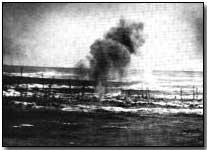Encyclopedia - Preliminary Bombardments
 Preliminary bombardments, widely discredited after the
early years of the war as a means of
providing a breakthrough in trench warfare, was considered in the pre-war period
a critical component in ensuring the success of any large-scale infantry attack.
Preliminary bombardments, widely discredited after the
early years of the war as a means of
providing a breakthrough in trench warfare, was considered in the pre-war period
a critical component in ensuring the success of any large-scale infantry attack.
Especially lauded in pre-war France (where Ferdinand Foch was a vocal supporter of the tactic) it was believed that a fierce preliminary bombardment would succeed not only in thoroughly demoralising the opposing force but would also largely succeed in clearing enemy trenches of resistance.
The reality, in the face of determined opposition and deeply excavated trench-lines, was very different. In spite of the rapid advance in the power of artillery as the war progressed, greater numbers of massed guns proved consistently ineffective in demonstrating breakthrough characteristics.
The Western Front in particular was the scene of vast artillery attacks, including the ferocious eight day long British preliminary bombardment which preceded the opening of the Battle of the Somme on 1 July 1916.
For the first two years of the war military strategists continued to believe that high explosive artillery could succeed in effectively smashing enemy belts of barbed wire, in addition to cowing trench defensive forces, thus producing the constantly sought-after breakthrough.
The experience of the Somme (among others) demonstrated disastrously the fallacy of the approach. Not only were barbed wire defences often left untouched but the opposing force was given ample warning of an impending infantry assault and could thus prepare its defences accordingly. Furthermore advancing infantry troops were often faced with the prospect of progressing over destroyed, crater-strewn areas of No Man's Land.
Experimented with in 1915 but increasingly deployed from the summer of 1916, artillery strategy shifted and became increasingly sophisticated, notably with the concept of so-called creeping barrages.
Nevertheless artillery was never able to alone produce the required battlefield breakthrough until its use was combined with increasing tank and aircraft support as an aid to infantry advances late in the war.
See also Barrages
A "red cap" was a British military policeman.
- Did you know?
